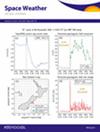Machine Learning-Based Emulator for the Physics-Based Simulation of Auroral Current System
IF 3.7
2区 地球科学
引用次数: 0
Abstract
Using a machine learning technique called echo state network (ESN), we have developed an emulator to model the physics-based global magnetohydrodynamic simulation results of REPPU (REProduce Plasma Universe) code. The inputs are the solar wind time series with date and time, and the outputs are the time series of the ionospheric auroral current system in the form of two-dimensional (2D) patterns of field-aligned current, potential, and conductivity. We mediated a principal component analysis for a dimensionality reduction of the 2D map time series. In this study, we report the latest upgraded Surrogate Model for REPPU Auroral Ionosphere version 2 (SMRAI2) with significantly improved resolutions in time and space (5 min in time, ∼1° in latitude, and 4.5° in longitude), where the dipole tilt angle is also newly added as one of the input parameters to reproduce the seasonal dependence. The fundamental dependencies of the steady-state potential and field-aligned current patterns on the interplanetary magnetic field directions are consistent with those obtained from empirical models. Further, we show that the ESN-based emulator can output the AE index so that we can evaluate the performance of the dynamically changing results, comparing with the observed AE index. Since the ESN-based emulator runs a million times faster than the REPPU simulation, it is promising that we can utilize the emulator for the real-time space weather forecast of the auroral current system as well as to obtain large-number ensembles to achieve future data assimilation-based forecast.基于机器学习的极光电流系统物理模拟器
我们利用一种称为回声状态网络(ESN)的机器学习技术,开发了一种仿真器,用于模拟 REPPU(REProduce Plasma Universe)代码基于物理学的全球磁流体动力学模拟结果。输入是带有日期和时间的太阳风时间序列,输出是电离层极光电流系统的时间序列,其形式为场对齐电流、电势和电导率的二维(2D)模式。我们通过主成分分析对二维地图时间序列进行了降维处理。在本研究中,我们报告了最新升级的 REPPU 极光电离层替代模型 2(SMRAI2),其时间和空间分辨率都有显著提高(时间 5 分钟,纬度 ∼ 1°,经度 4.5°),偶极子倾斜角也被新添加为输入参数之一,以再现季节依赖性。稳态电势和场对齐电流模式对行星际磁场方向的基本依赖关系与从经验模型中得到的结果一致。此外,我们还展示了基于 ESN 的仿真器可以输出 AE 指数,这样我们就可以将动态变化的结果与观测到的 AE 指数进行比较,从而评估其性能。由于基于 ESN 的模拟器的运行速度比 REPPU 仿真快一百万倍,我们有望利用该模拟器进行极光海流系统的实时空间天气预报,并获得大量集合,以实现未来基于数据同化的预报。
本文章由计算机程序翻译,如有差异,请以英文原文为准。
求助全文
约1分钟内获得全文
求助全文

 求助内容:
求助内容: 应助结果提醒方式:
应助结果提醒方式:


